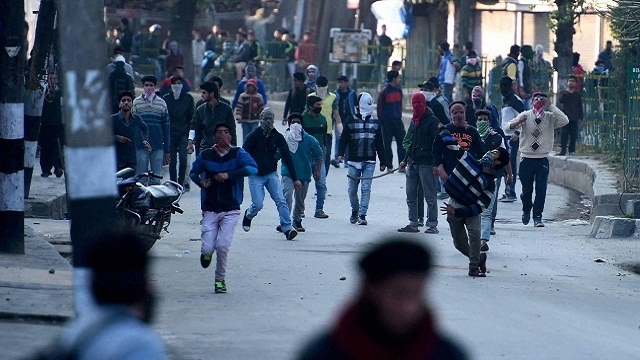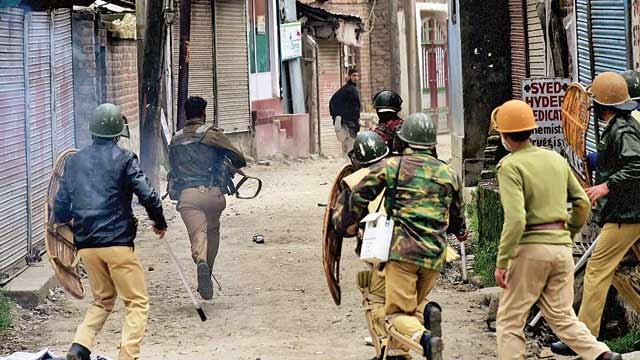
The unrest in Kashmir Valley of three weeks and more is trouble as usual, and to pretend otherwise is hypocrisy. But this is as good a moment as any to see the Kashmir issue as it is.
Many ardent Kashmiris—and there are only ardent Kashmiris no less—explain to you with quiet contempt that the Kashmir problem is not one of law and order, of unemployment and poverty, of economic distress or of the presence of the Indian Army and the Armed Forces Special Powers Act (AFSPA). They say that the Kashmir problem is about India, Pakistan and Kashmiris. They want to push India to the negotiating table and they want India to sort out the Kashmir problem with Pakistan. In the bargain, they hope that they can wring out the maximum benefits, including total autonomy for them—which will entail intimate social and economic ties with Pakistan— and that strained India-Pakistan relations not come in the way of Kashmir’s contacts with Pakistan.
This is the explicit and implicit refrain of the major political players— the National Conference, the People’s Democratic Party (PDP), and the many factions of the Hurriyat. Their argument is simple. The imperatives of geography dictate close relations between Kashmir and Pakistan. Kashmiris believe that India and Pakistan may have had the Partition, but it is unreasonable to ask Kashmiris to accept the political consequences of it. Punjabis on both sides moan the good old days of the undivided province of pre-Independence era but they are reconciled to the reality of political borders and loyalty to their respective states. The Bengalis, for reasons of their own history and the different power equation between Hindus and Muslims in pre-Independence Bengal, are cool and polite towards each other. They are content to share Rabindranath Tagore and hilsa but nothing more than that. Not so with the Kashmiris.
The Kashmiris want to pretend that there has been no Partition, and if there has been one, it has nothing to do with them. In a sly manner, Kashmiris would even argue that they are the best connection between the two countries—the estranged siblings—and that India should indeed be grateful to them for facilitating the undoing of, at least partially, the ugly fact, the deep cultural gash that is the Partition. Of course, this is nothing more than hogwash. The reality is different. The reality is that there are two sovereign states, India and Pakistan, and Kashmir is the bone of contention.

Pakistan believes that the Partition would be truly complete only if Muslim-majority Jammu and Kashmir becomes part of Pakistan. India is caught in an unwanted situation. India was not interested in Kashmir. It was dragged into Kashmir. Sheikh Abdullah did not subscribe to the idea of the Muslim nation in 1947 and was not keen on joining Pakistan. Contrary to popular perception, it was Hari Singh, the Dogra ruler of the princely state of Kashmir who was weighing his options, hoping to get the best bargain from the two new states of India and Pakistan. But what frightened Hari Singh was the arrival of the tribal raiders. And the Kashmiri people were woken up rudely. It was in a moment of panic that Hari Singh sought help from India. He did not want to join India though he must have known that he had no other option.
It was Sheikh Abdullah who was attracted to India, and the people of Kashmir were willing to accept his preference. So, it should be clear. India did not think of bringing Kashmir into the Union. Kashmir came on its own. There was no need for the special status provision of Article 370. There was no need for referendum. Kashmiris opted for India. If they did not, they could have easily voted with their feet for Pakistan by supporting the raiders. They did not. Jawaharlal Nehru’s mistake was to believe that a Muslim majority province becoming part of India would be a snub to the idea of the Muslim nation that Pakistan wanted to be. He seems to have been overwhelmed by Abdullah and the Kashmir people’s decision to join India.
The mistake was not complaining to the United Nations about Pakistan’s aggression in Kashmir. The mistake was to think that India needed Muslim-majority Kashmir in order to be a pluralist country. There were enough Muslims who remained in India to make the point against Jinnah’s idea of a nation for Muslims. It is possible that Abdullah had also sensed at the time the advantage that Kashmir would enjoy in a Hindu-majority India, which was wedded to the idea of pluralism. Of course, the historical truth was that Pakistan did not become the Muslim nation that it wanted to be because there were still religious minorities left behind there, especially in the then East Pakistan. And, of course, the Muslim League was suspect in the eyes of the ideologue of the Islamic nation, Maulana Abu Ala Maududi of Jamaat-e-Islami, even as Congress was suspect in the eyes of Hindu Mahasabha and the Rashtriya Swayasevak Sangh (RSS). There was this difference between the Muslim League and the Indian National Congress. Muslim League did claim to represent the Muslims and no one else, and the Congress asserted that it represented everyone and not just the Hindus. As a matter of fact, the Mahasabha and the RSS were angry with the Congress because it chose to represent Muslims as well.
It was this implicit social and moral contract between the people of Kashmir and India, as it was in the case of the 500 and more princely states that got overturned with the emergence of militancy in the Valley in the early 90s. The blunders by the Central government—which included the agreement Indira Gandhi made with Sheikh Abdulla, handing over Kashmir to Abdullah as though it was his fiefdom—were too many. A corrupt political cabal was allowed to dominate the valley. Of course, Indira Gandhi based her decision on the realistic political calculation that Abdullah was still the popular leader in Kashmir. He was. It was however a short-sighted calculation but she had no other option.
The fault lies with the leaders of Kashmir as well as its articulate section. They wanted to double-cross both India and Pakistan. But there was a heavy price to pay for it. Pakistan was forced to send in the infiltrators and destroy peace and social stability in the valley. And India had no option but to send in the Army to fight the infiltrators and the militants. The people of Kashmir were caught in the cross-fire between Pakistani infiltrators and the Indian army. Kashmiris find it easy to hate the Indian Army because the infiltrators have slunk away. The people faced the brunt of the Army.

It will be a legitimate demand of the people of Kashmir to ask the Army to get out of the way. As a matter of fact, wily Kashmiri politicians and the cunning liberals who support them argue that they want the Indian Army to be placed at the India-Pakistan border but not in towns and villages of the Kashmir Valley. But the Kashmiri politicians and the liberals know as well as anyone else that the infiltrators get into Kashmir towns and villages. They do not stand up and challenge the Indian Army at the border. It is bad business for the Army. They have to root out the infiltrators and, in the process, incur the wrath of the people.
The silent majority in the Valley cooperate with the Army, but that’s not the case with the articulate minority. They want to use the pretext of the atrocities of the Army to bargain for the “solution” of the Kashmir question” and they are not content with the withdrawal of AFSPA.
It is in this situation that Indian political leaders must get their moral moorings right. The leaders must know that India has to fight Pakistan in Kashmir because the Union government is legally and morally bound to defend Kashmir against Pakistan. It was the original mission of the Indian Army in 1947 and it remains the mission of the army in 2016.
Abraham Lincoln’s words from his First Inaugural Address, which he delivered on March 4, 1861, are most relevant for politicians here. His address was on the eve of the American Civil War because the southern states had threatened to secede from the Union. Lincoln said that he would not violate the right of the southern states to continue with slavery, but he was duty-bound as president of the United States to defend the Union because he had sworn to protect and defend the Constitution.

But he was not willing to concede to the Southern states the right to secede if they were to find themselves in a minority on the issue of slavery. He had definite views on the matter.

Leaders of Kashmir can argue for all the autonomy they desire, but they cannot threaten to secede. The Union has the right to defend itself for the sake of the people of Kashmir and it will be legitimate to do so.
It would appear that the hot-headed and populist leaders in Kashmir will bring nothing but ruin upon the people of the Valley by the irresponsible talk of ‘azadi’. There is need to stop them from unleashing destruction on the people of Kashmir.